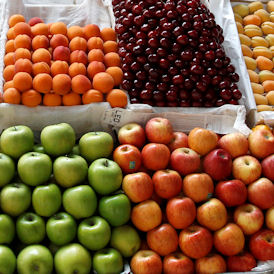E.coli brings EU veg trade to ‘standstill’
The E.coli outbreak has brought the EU vegetable trade – worth one billion euros a week – to an “alarming standstill” as consumers get sucked into a “dialogue of fear”, an expert tells Channel 4 News.

Experts have said they do not yet know what has caused a major European E.coli outbreak, which has infected 1,600 and killed at least 18 people so far.
But early accusations that Spanish cucumbers could be the cause have left their mark. Headlines around Europe screamed that “killer salad” was to blame and consumers abandoned lettuce, cucumbers and tomatoes in droves.
Now Governments are getting in on the act. Russia has banned all EU imports of vegetables, threatening an import trade that is worth €400m a year to the European Union. It has also banned fruit imports.
Prime Minister Vladimir Putin said he would not “poison” Russians to comply with World Trade Organisation rules, which state that a foodstuff cannot be banned without strong scientific evidence.
How to avoid the E.coli outbreak
The outbreak has also caused diplomatic ructions within the EU. Spanish officials have suggested they may seek compensation from Germany, after its officials originally linked the outbreak to Spain’s farmers.
People’s food consumption drops suddenly as soon as something like this happens. Professor Richard Tiffin
At this point, the global hysteria over salad vegetables is spreading despite the fact that, so far, the infections seem to be centred on northern Germany and experts are still saying they still cannot say definitively what the source is.
‘Dialogue of fear’
But hysteria of this type is inevitable without information, a food economics expert told Channel 4 News.
“People’s food consumption drops suddenly as soon as something like this happens,” Professor Richard Tiffin, head of Reading University’s Department of Agricultural and Food Economics.
“It’s important to get good quality information out there as fast as possible to maintain confidence. Where there is doubt about food you have got to respond by taking it off the shelves, otherwise there is a dialogue of fear for consumers.”
This so-called “dialogue of fear” has been running on unchecked since the first E.coli cases were reported internationally at the end of May – and it is hitting the EU vegetable trade hard.
Economic impact
Fresh weekly vegetable trade across Europe worth €1bn on a weekly basis
Spain estimates it is losing €200m a week as a result of the E.coli scare
Russia has banned EU imports of vegetables, a €400m market annually
Source: Freshfel Europe
Philippe Binard, the General Delegate of Freshfel Europe, the European Fresh Produce Association, said the weekly trade is at an “alarming standstill”.
He told us: “We estimate the fresh vegetable trade across Europe to be on a weekly basis worth €1bn. This turnover has been seriously affected in the last week with the cancellation of the programme mainly in cucumbers, lettuces and tomatoes.
“Overall the vegetable market is suffering, and to a lesser extent fruit. It is not only the German market which is distorted, it is also many other markets noting a slow down in volume and low prices.”
Professor Tiffin told Channel 4 News: “This could have a huge impact. The thing about salad crops is that they are highly perishable. In that way it is completely different to the BSE scares.
“You can keep a cow for a few months – it might cost you a bit in food, but it is still saleable. But fruit and veg is ready on the day and that’s it.”
He said farmers would be suffering desperately in the short-term, and long term he suggested the scare was likely to have an impact on attitudes to quality assurance in food chains – and could push consumers away from small retailers and towards supermarkets, where the supply chain appears easier to trace.
He added: “The evidence says that in general these things are short-lived but what happens is that they are cumulative. The more scares you get, the greater the impact of any individual incident.”
-
Latest news
-
‘Government responsiveness should be improved’ says infected blood inquiry chair4m

-
Infected Blood scandal: How UK failed on a global scale4m

-
‘There’s a strong evidential basis’ for ICC to grant arrest warrants for Netanyahu, says criminal law expert4m

-
International Criminal Court prosecutor seeks arrest warrants for Israel PM and Hamas leaders3m

-
‘Highly unlikely there was foul play’ in Iran president helicopter crash, says Tehran professor5m

-




